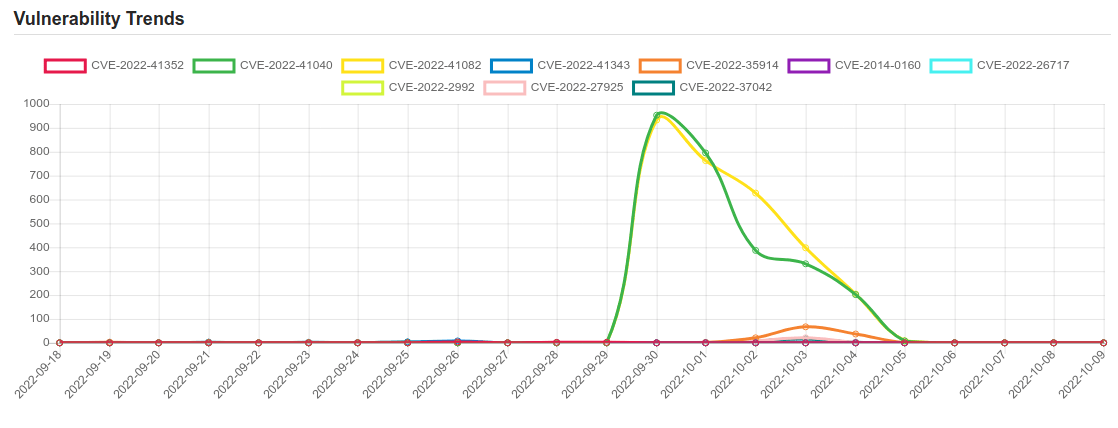Daily Vulnerability Trends: Mon Oct 10 2022

| CVE NAME | CVE Description |
| CVE-2022-26717 | No description provided |
| CVE-2022-2992 | No description provided |
| CVE-2022-27925 | Zimbra Collaboration (aka ZCS) 8.8.15 and 9.0 has mboximport functionality that receives a ZIP archive and extracts files from it. An authenticated user with administrator rights has the ability to upload arbitrary files to the system, leading to directory traversal. |
| CVE-2022-37042 | Zimbra Collaboration Suite (ZCS) 8.8.15 and 9.0 has mboximport functionality that receives a ZIP archive and extracts files from it. By bypassing authentication (i.e., not having an authtoken), an attacker can upload arbitrary files to the system, leading to directory traversal and remote code execution. NOTE: this issue exists because of an incomplete fix for CVE-2022-27925. |
| CVE-2022-27924 | Zimbra Collaboration (aka ZCS) 8.8.15 and 9.0 allows an unauthenticated attacker to inject arbitrary memcache commands into a targeted instance. These memcache commands becomes unescaped, causing an overwrite of arbitrary cached entries. |
| CVE-2022-26766 | A certificate parsing issue was addressed with improved checks. This issue is fixed in tvOS 15.5, iOS 15.5 and iPadOS 15.5, Security Update 2022-004 Catalina, watchOS 8.6, macOS Big Sur 11.6.6, macOS Monterey 12.4. A malicious app may be able to bypass signature validation. |
| CVE-2022-39222 | No description provided |
| CVE-2022-34918 | An issue was discovered in the Linux kernel through 5.18.9. A type confusion bug in nft_set_elem_init (leading to a buffer overflow) could be used by a local attacker to escalate privileges, a different vulnerability than CVE-2022-32250. (The attacker can obtain root access, but must start with an unprivileged user namespace to obtain CAP_NET_ADMIN access.) This can be fixed in nft_setelem_parse_data in net/netfilter/nf_tables_api.c. |
| CVE-2021-26411 | Internet Explorer Memory Corruption Vulnerability |
| CVE-2022-3436 | No description provided |
| CVE-2022-3435 | No description provided |
| CVE-2022-28893 | The SUNRPC subsystem in the Linux kernel through 5.17.2 can call xs_xprt_free before ensuring that sockets are in the intended state. |
| CVE-2022-40684 | No description provided |
| CVE-2022-41352 | An issue was discovered in Zimbra Collaboration (ZCS) 8.8.15 and 9.0. An attacker can upload arbitrary files through amavisd via a cpio loophole (extraction to /opt/zimbra/jetty/webapps/zimbra/public) that can lead to incorrect access to any other user accounts. Zimbra recommends pax over cpio. Also, pax is in the prerequisites of Zimbra on Ubuntu; however, pax is no longer part of a default Red Hat installation after RHEL 6 (or CentOS 6). Once pax is installed, amavisd automatically prefers it over cpio. |
| CVE-2022-41040 | No description provided |
| CVE-2022-41082 | No description provided |
| CVE-2022-41343 | registerFont in FontMetrics.php in Dompdf before 2.0.1 allows remote file inclusion because a URI validation failure does not halt font registration, as demonstrated by a @font-face rule. |
| CVE-2022-35914 | /vendor/htmlawed/htmlawed/htmLawedTest.php in the htmlawed module for GLPI through 10.0.2 allows PHP code injection. |
| CVE-2022-41852 | No description provided |
| CVE-2014-0160 | The (1) TLS and (2) DTLS implementations in OpenSSL 1.0.1 before 1.0.1g do not properly handle Heartbeat Extension packets, which allows remote attackers to obtain sensitive information from process memory via crafted packets that trigger a buffer over-read, as demonstrated by reading private keys, related to d1_both.c and t1_lib.c, aka the Heartbleed bug. CVSS V2 scoring evaluates the impact of the vulnerability on the host where the vulnerability is located. When evaluating the impact of this vulnerability to your organization, take into account the nature of the data that is being protected and act according to your organization’s risk acceptance. While CVE-2014-0160 does not allow unrestricted access to memory on the targeted host, a successful exploit does leak information from memory locations which have the potential to contain particularly sensitive information, e.g., cryptographic keys and passwords. Theft of this information could enable other attacks on the information system, the impact of which would depend on the sensitivity of the data and functions of that system. |
A considerable amount of time and effort goes into maintaining this website, creating backend automation and creating new features and content for you to make actionable intelligence decisions. Everyone that supports the site helps enable new functionality.
If you like the site, please support us on Patreon using the button below

To keep up to date follow us on the below channels.




![[CRYPTO24] - Ransomware Victim: N8XT 6 image](https://www.redpacketsecurity.com/wp-content/uploads/2024/09/image-300x300.png)
![Cobalt Strike Beacon Detected - 101[.]126[.]21[.]197:8443 7 Cobalt-Strike](https://www.redpacketsecurity.com/wp-content/uploads/2021/11/Cobalt-Strike-300x201.jpg)